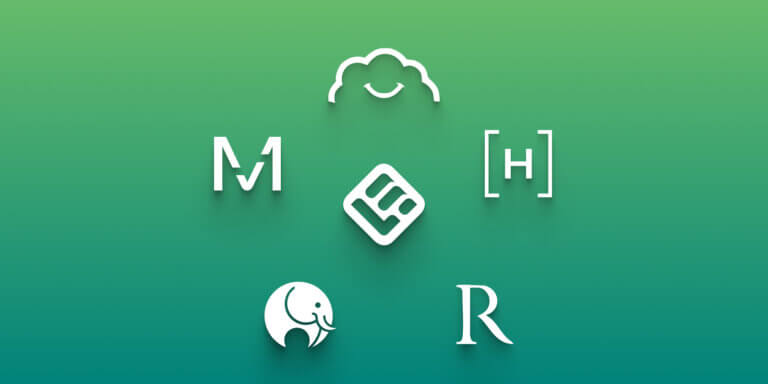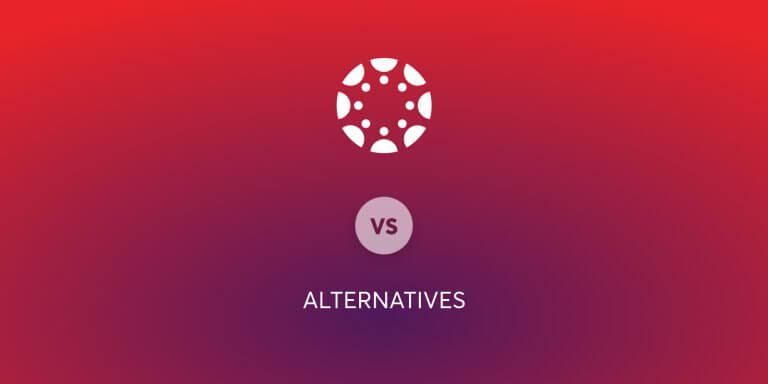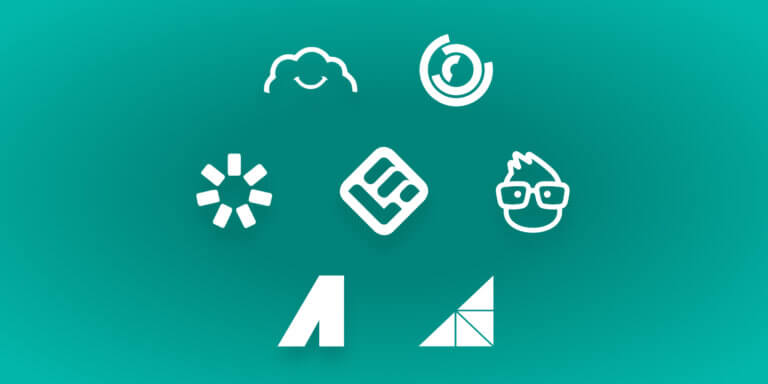Table of Contents
The healthcare sector is heavily regulated. With dozens of safety guidelines and compliance regulations, the only way healthcare employees can keep up is to undergo rigorous and regular training.
On top of that, health workers are extremely busy, and most of them are deskless. Therefore, their training programs must be well-structured, yet flexible enough to fit their schedules and meet them where they are.
Investing in a Learning Management System (LMS) and moving your training programs online will transform how your healthcare business handles compliance and employee development. It will help you streamline, deliver, and monitor your training initiatives to ensure every employee is aligned with the latest compliance requirements and best practices in the field.
Don’t worry about how to do this. We’ve done the heavy lifting for you and singled out the top 6 healthcare LMS platforms based on feature availability and user reviews. You can trust any of these platforms to streamline your training efforts and stay on top of compliance.
We’re also covering:
Before jumping to the full reviews, here’s a quick table with key features, use cases, and pricing information for each platform.
The benefits of using medical education software for healthcare providers
Healthcare organizations operate in a highly regulated, fast-evolving environment where effective, ongoing training is critical. A specialized healthcare learning management system (LMS) offers the tools, flexibility, and scalability required to meet these unique demands and deliver training quickly and efficiently.
Here’s why healthcare needs specialized LMS solutions.
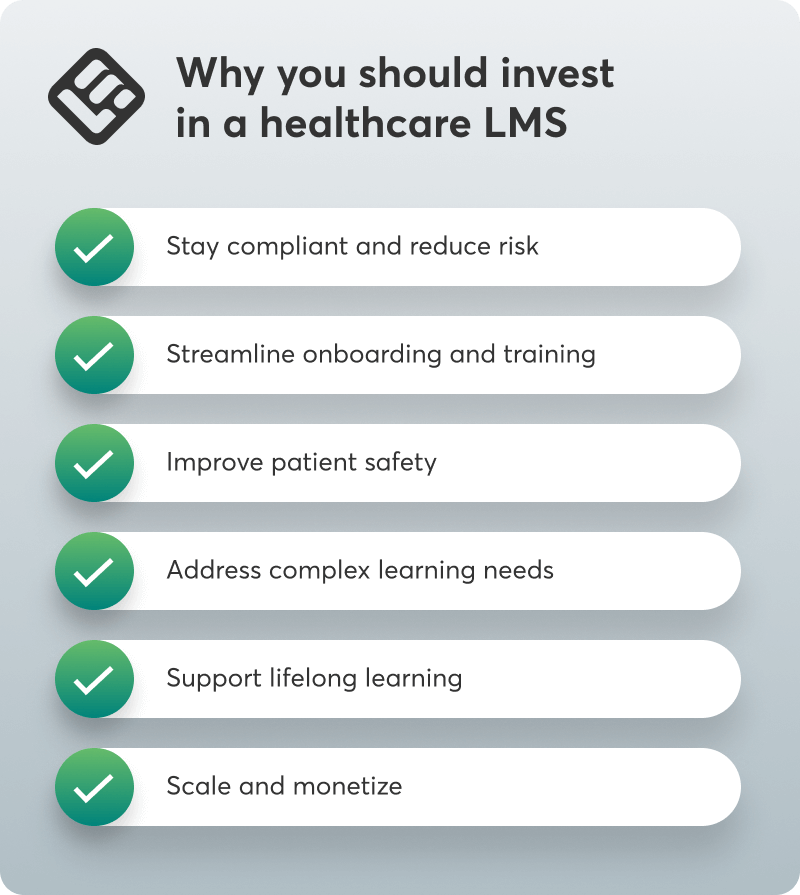
Stay on top of compliance requirements
A purpose-built healthcare LMS enables organizations to deliver and document compliance training aligned with regulatory standards like HIPAA and OSHA. It streamlines and partly automates compliance tracking and certificate management, reducing risk and ensuring healthcare professionals meet mandatory requirements on time.
Address complex learning needs
Healthcare professionals face complex, often mandatory training needs across clinical protocols and interdisciplinary collaboration. A specialized LMS supports tailored training with role-specific modules, mobile access for deskless workers, and integration with HR and EHR systems—features typically missing from generic platforms.
Support continuous education
As the industry evolves, healthcare employees must continuously develop their skills even within the fast-paced rhythm of their jobs. A healthcare LMS supports lifelong learning by offering CME courses, skill assessments, and personalized learning paths that improve care quality and boost employee retention.
Streamline onboarding and training
An LMS streamlines employee onboarding through structured, role-based programs that prepare new hires to contribute to high-quality patient care from day one. This reduces ramp-up time and ensures consistent training across the organization.
Improve patient outcomes and safety
By promoting consistent and up-to-date training, a healthcare LMS helps staff deliver safer, more effective patient care. Well-informed professionals follow standardized protocols, make fewer errors, and stay aligned with the latest clinical best practices.
Scale and monetize your courses
A healthcare LMS enables organizations to scale their training efforts efficiently across departments or locations with features like centralized management and support for unlimited users. Additionally, you can monetize your expertise by selling or licensing healthcare courses.
7 key features to look for in healthcare LMS software
A specialized learning management system for healthcare should support both the administrative side of training and the unique learning needs of medical professionals. Here are the essential features to look for:
1. Compliance and regulatory tools
Healthcare organizations must manage strict compliance training requirements. Your LMS should offer everything needed to deliver and track certification programs, such as a robust assessment engine, certificate builder, and automated alerts for expiring certifications. This will help minimize knowledge gaps.
2. Reporting and analytics
Accurate and real time insights are essential to track progress and maintain regulatory compliance and even workplace safety. Look for in-depth analytics features, including a gradebook, dashboard and charts for at-a-glance performance overviews, and customizable reports that help you track completion rates and identify gaps that could impact patient outcomes.
3. Efficient user and academy management
Managing a large healthcare workforce can be resource-intensive. A healthcare learning management system should simplify admin work with bulk actions, automated workflows, user segmentation, and integrations with your existing HR or EHR systems, freeing up time to focus on what matters most.
4. Course creation and content management
An all-in-one platform streamlines course creation. Built-in content authoring tools, preferably enhanced with AI, allow you to create, edit, and organize training materials without relying on third-party tools. Look for SCORM compliance, multimedia support, and templates to accelerate content development.
5. Personalized learning paths
Support diverse learner needs with customizable learning paths, content dripping, and role-based group management. This targeted approach boosts learner engagement and ensures the right people get the right training at the right time, therefore successfully enhancing employee performance.
6. Advanced security features
Data privacy is non-negotiable in healthcare. Your LMS must safeguard sensitive information, including training materials, certifications, and even patient outcomes data, through robust encryption, secure user authentication, and role-based access controls.
7. Dedicated mobile app
Healthcare professionals often work irregular hours and across multiple locations. A dedicated mobile app lets them access learning anytime, anywhere. Features like offline access, push notifications, and learning reminders facilitate continuous learning on the go.
6 best healthcare LMS platforms reviewed
Let’s move on to our top options for the best LMS for healthcare. These platforms meet all the criteria for healthcare training and are trusted by other healthcare professionals like you.
So if you, too, are interested in healthcare elearning solutions, these are the first places to go.
1. LearnWorlds
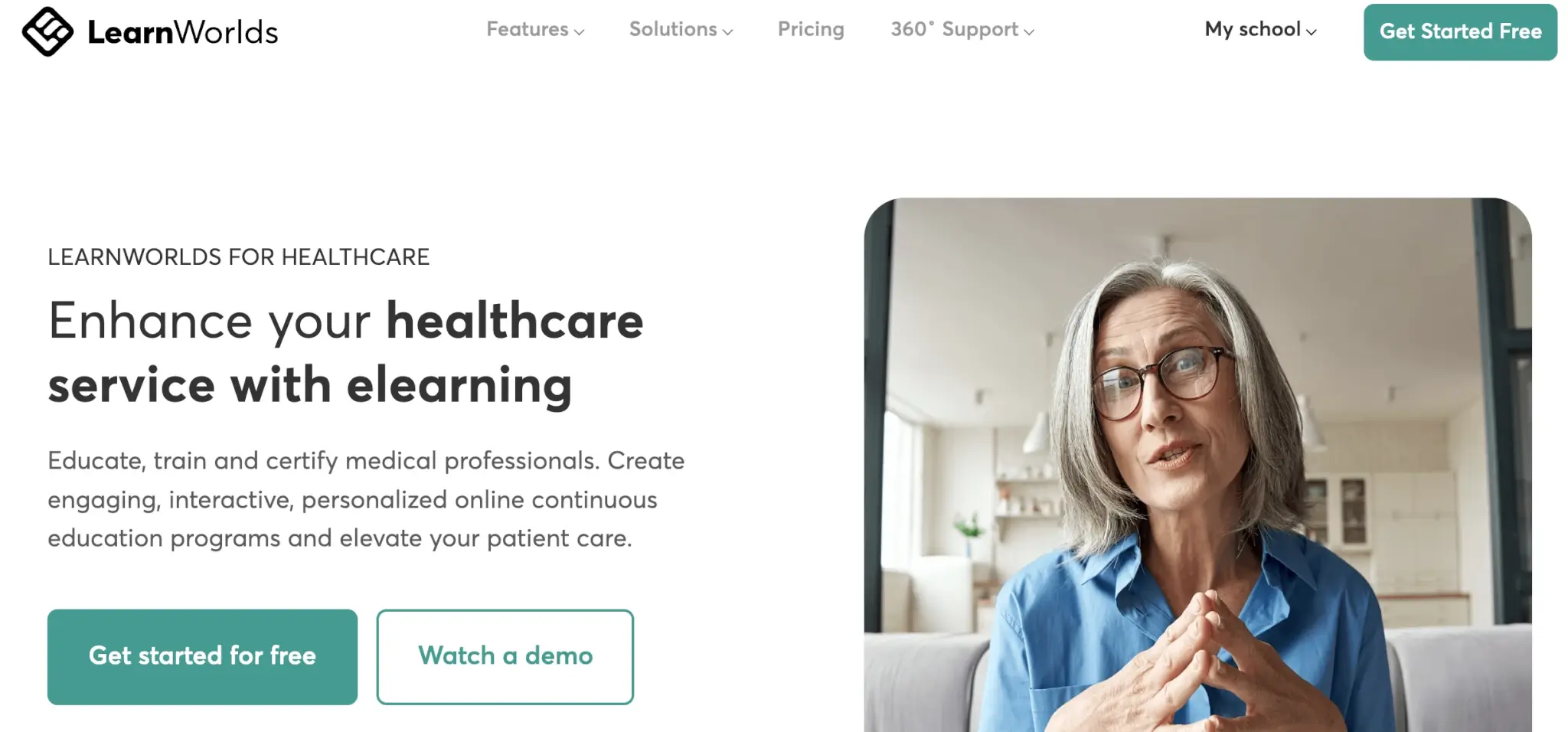
LearnWorlds is an all-in-one learning platform suitable for healthcare and compliance training, whether you seek to train employees or sell healthcare courses to medical professionals. Our SCORM-compliant LMS enables healthcare businesses to build vibrant training courses supporting blended, self-paced, and mobile learning as well as live sessions and webinars.
LearnWorlds is user-friendly and has intuitive navigation; plus, it offers a white-label mobile app with in-app notifications, offline access, and learning reminders. With multiple integrations and APIs available, you can further customize the platform and streamline your workflows.
LearnWorlds features built-in content authoring and an interactive video editor for compelling videos. Our AI assistant, featuring more than 200 pre-built prompts, helps you optimize your course creation process and build a course plan with modules and learning activities. With our built-in community and gamification elements, you can engage learners further.
LearnWorlds also offers a powerful assessment builder with different types of quizzes for your training courses, a survey builder, and a certificate builder for offering customizable, shareable certificates. With Accredible and Credly integrations, LearnWorlds supports certificate management too.
Automated and in-depth data reporting enhanced with AI allows you to monitor learner progress and engagement with content at any given moment. Standout features of our reporting system include 21+ charts, data visualizations, 70+ filters, and a course dashboard where you can see everything at a glance. Metrics like time spent on each activity, quiz scores, number of certificates issued, and course performance are also available.
LearnWorlds also supports your scalability efforts, always in tandem with security, as we provide Multiple Schools functionality, efficient user management with automated/bulk actions and tagging, unlimited users, multilingual support, and adherence to strict data security standards.
One downside of our training platform is that, due to its extended capabilities, it might take you longer to explore and uncover all its features and find your way around it. That said, we offer LearnWorlds Academy, daily webinars, an impressive resource library with guidelines, videos, and webinars, and a stellar customer support team, to help you navigate our platform and discover all its capabilities—all accessible without extra fees.
Advantages
- AI Insights Hub
- Built-in content authoring with AI
- SCORM compliance
- Certificate builder
- Certificate management
- Gradebook
- Multiple exams and assessments
- Built-in community
- Content dripping
- eCommerce ready
- Multiple schools
- Custom user roles & groups to control access
- Advanced security features to protect sensitive data
- Top-notch customer support
- White-label website & mobile app
Disadvantages
- No integration with HR/EHR systems (only via Zapier)
- Learning curve
Pricing
LearnWorlds offers a 30-day free trial (no credit card required), during which most features are available, and three main plans:
*Pricing information was retrieved from LearnWorlds on June 23, 2025.
2. TalentLMS
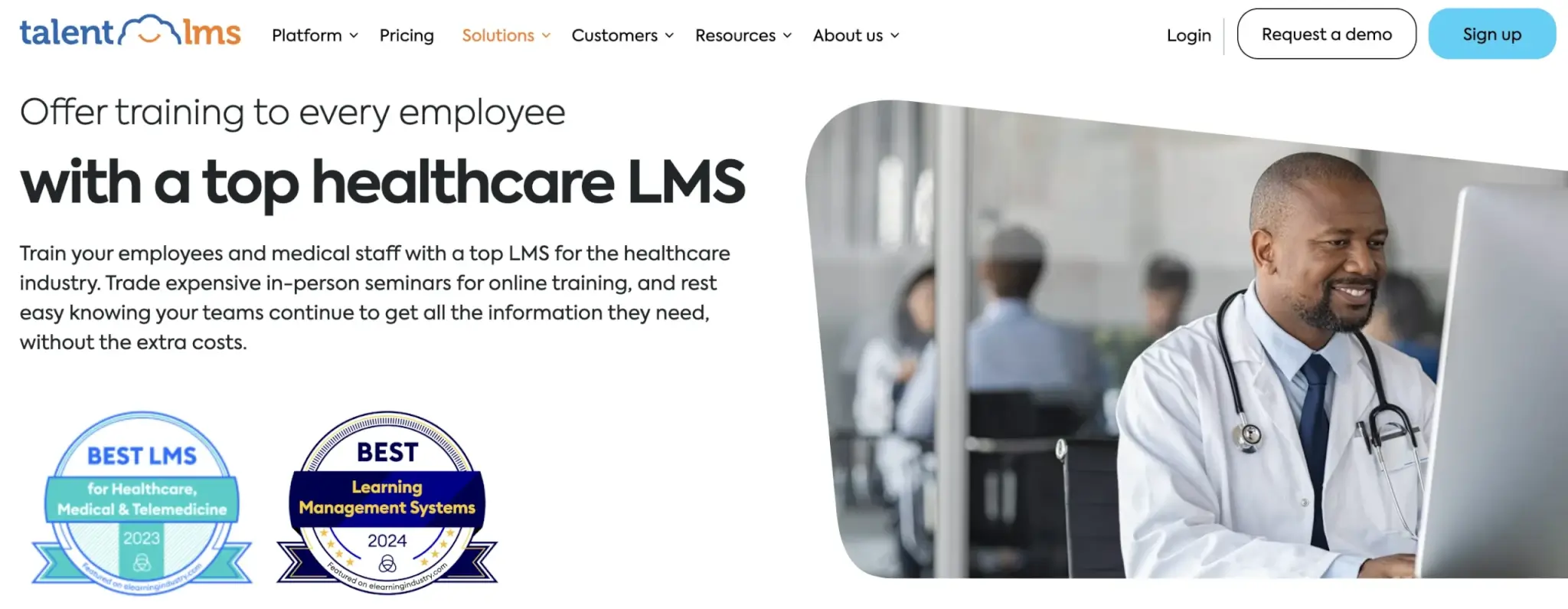
TalentLMS is a user-friendly LMS that comes at an affordable price. It’s one of the top LMS systems for healthcare employees and can easily be used as a medical training platform, since it’s a reliable tool that has been tried and recommended by many businesses. TalentLMS allows you to either build your online course from scratch or buy ready-made training content from its built-in resource library, which includes courses for medical professionals.
TalentLMS offers AI content creation. It automates certain tedious tasks, like course assignments, and does a very good job with certificate and compliance management, as it allows you to send automatic reminders when a certificate expires.
That said, TalentLMS doesn’t offer a Gradebook for quick monitoring of learner progress. Customer reviews mention that the assessment builder lacks advanced options, which can be limiting for compliance training.
Advantages
- Off-the-shelf content
- Advanced reporting
- Compliance management
- White label mobile app
- AI tool
Disadvantages
- Lacks advanced assessment options
- No Gradebook
- Occasional hiccups when setting up integrations
- Limited design customization
- Not as intuitive for admin tasks
Pricing
Instead of a free trial, TalentLMS offers a free plan that supports up to 5 users and 10 courses. It offers tiered pricing plans that start from $149/mo with a 40-user limit.
*Pricing information was retrieved from TalentLMS on June 23, 2025.
3. Relias
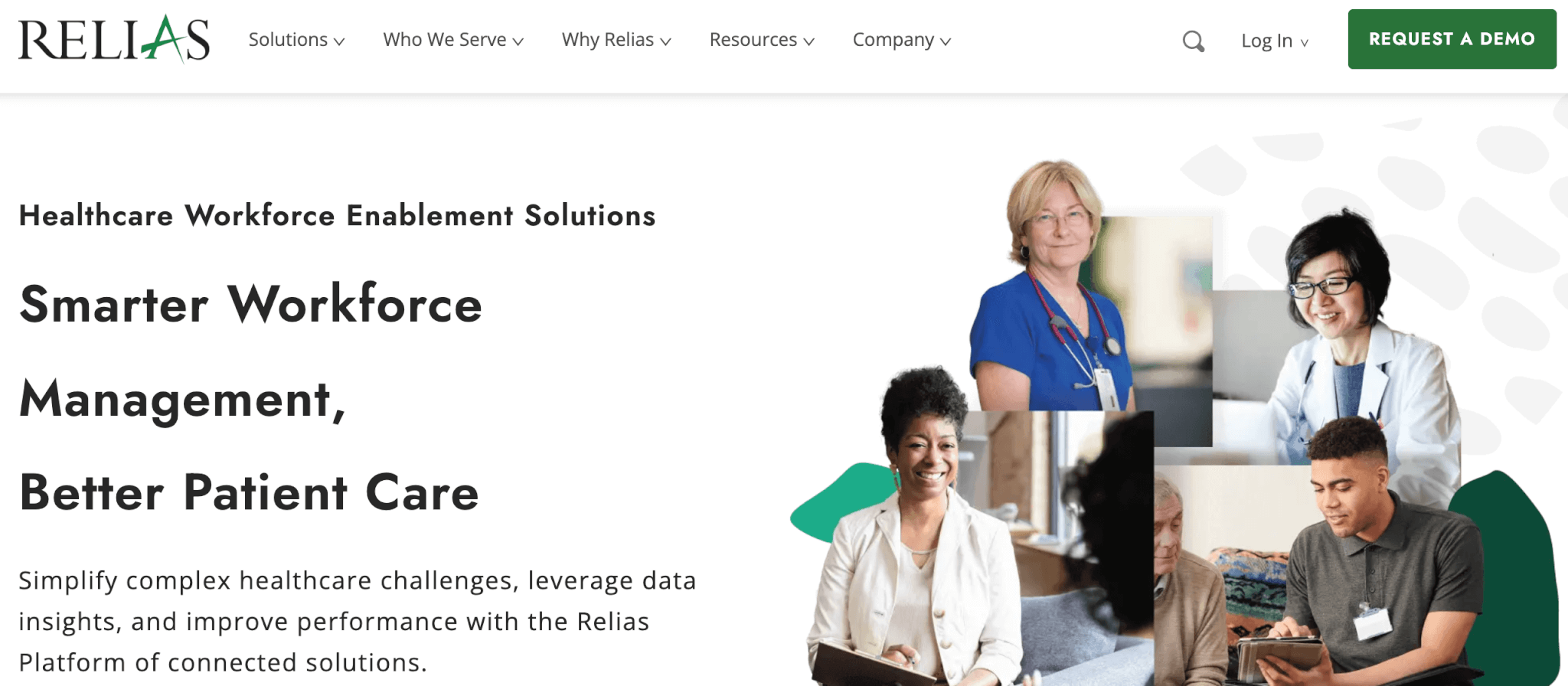
Relias healthcare LMS is a cloud-based training solution designed to help healthcare organizations manage staff training initiatives and maintain credentialing and compliance standards.
Relias is widely used in the healthcare industry, offering a library of over 3,000 pre-built learning content, including customized options tailored to specific organizational needs. The system is praised for its strong compliance management features, including automatic reminders for certification renewals, progress tracking, and reporting, making it a reliable tool for meeting regulatory standards.
However, user reviews mention that the platform’s interface is outdated and not always intuitive, especially the reporting system, which is somewhat overwhelming. Customer support also receives mixed reviews, with some users experiencing slow response times.
Advantages
- Library of healthcare-specific content
- Compliance management
- Detailed reporting and analytics
- Integration with healthcare software
- Competency tracking & scenario-based learning
Disadvantages
- Outdated and non-intuitive UI
- Steep learning curve for reporting
- Mixed customer support experience
- Limited course content customization
- Occasional performance issues
Pricing
Relias doesn’t offer relevant pricing information on its website.
4. HealthStream
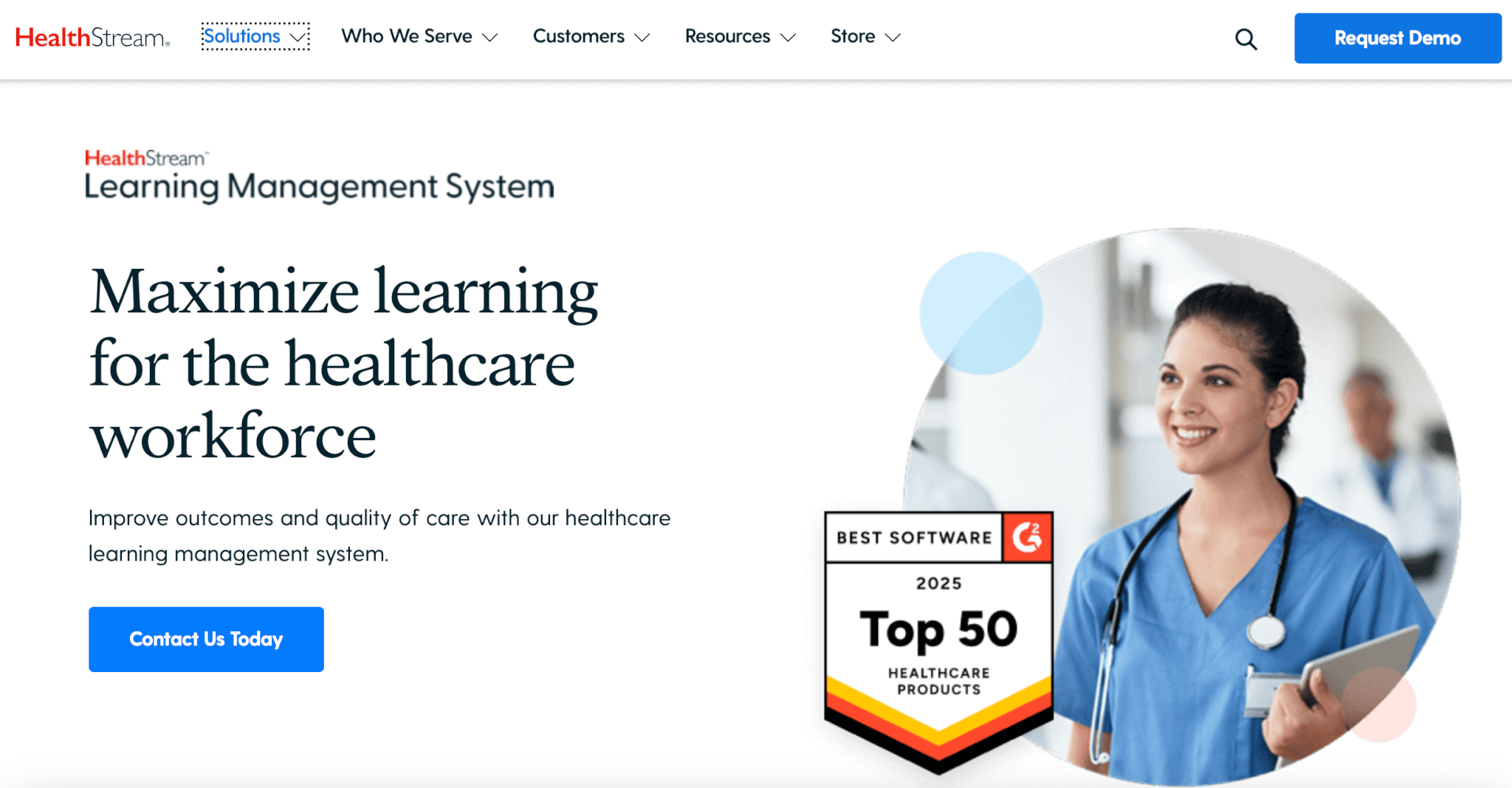
HealthStream is one of the best learning management systems designed to support effective training and help healthcare organizations meet accreditation requirements and ensure compliance. It offers blended learning capabilities, supporting multimedia content, responsive design, and integration with third-party healthcare courses.
HealthStream focuses on compliance-based training, featuring certification tracking and automated reminders, which help administrators stay on top of required training. It also promotes social learning through discussion boards and collaboration tools to enhance engagement. However, some reviews mention that the user interface is a bit outdated and that the reporting system can be challenging to customize.
Advantages
- Compliance tracking
- Certification management
- Multimedia support
- Third-party content integration
- Automated reminders
Disadvantages
- Limited customization in reports
- Cumbersome reporting system
- Outdated UI for some users
- Lacks advanced learner assessments
- Not as intuitive for administrators
Pricing
HealthStream doesn’t offer relevant pricing information on its website.
5. Tovuti LMS

Tovuti LMS is an LMS with a user-friendly interface, highly customizable, and offers many available integrations to enhance its functionalities. It supports various types of content for an engaging learning experience, including support for live sessions. One of the platform’s advantages is the certificate management feature that allows you to track compliance more effectively.
Additionally, Tovuti LMS provides basic eCommerce features in case you want to monetize your courses. However, it falls short in terms of assessments, which are limited to multiple-choice questions. Customer reviews also mention that it is expensive and that customer support is occasionally slow to reply.
Advantages
- Compliance management
- Intuitive UI
- Good reporting
- Gamification
- eCommerce capabilities
Disadvantages
- Basic quiz functionality & no Gradebook
- Slow customer support
- No AI tools
- Limited customization options
- Expensive
Pricing
Tovuti LMS doesn’t offer relevant pricing information on its website.
6. MedTrainer
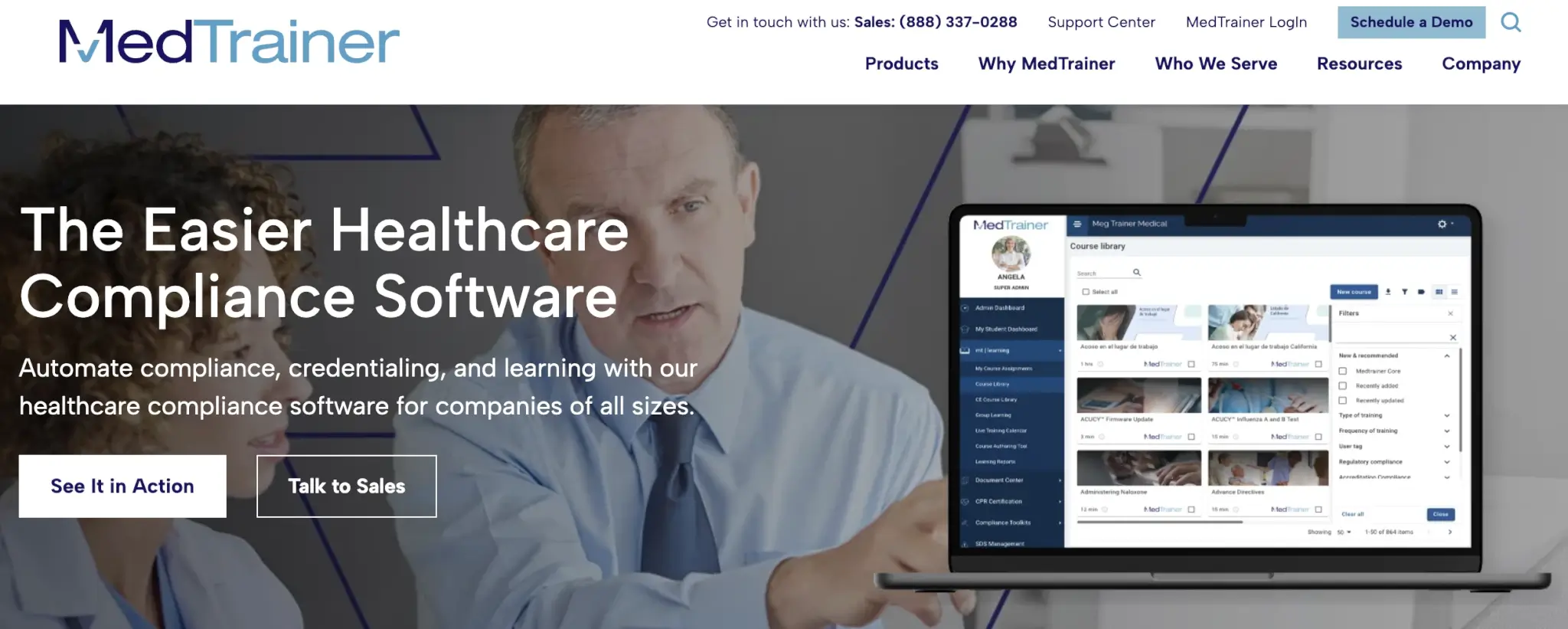
MedTrainer is a specialized clinical education management system that offers ready-made courses for healthcare professionals, covering aspects from onboarding to compliance. The courses are customizable to meet specific organizational needs, and users can import their own training materials or have MedTrainer’s team create courses from scratch.
Key features include certificate management, learning analytics, and a Gradebook, ensuring that all essential training requirements are addressed. MedTrainer also offers custom course development. However, some users report difficulties navigating the platform, especially when configuring reports, and mention limitations in administrative tasks, such as the lack of bulk action capabilities.
Advantages
- Off-the-shelf interactive courses
- Certificate management
- In-depth reporting capabilities
- Gradebook functionality
- User roles management
Disadvantages
- Doesn’t support mobile learning
- Some glitches with courses and reporting
- Slow customer support
- Steep learning curve
- Not very efficient for administrative tasks
Pricing
MedTrainer offers flexible packages based on the number of users or providers but doesn’t provide specific pricing information.
The role of healthcare LMS in employee development and retention
Any of these healthcare LMS systems can help to support the skill development of healthcare professionals, but also their involvment with your organization. It can show how invested they are in your business and how in touch they are with their own practice.
This is done, of course, through the delivery of structured, scalable, and personalised learning that comes with the use of the LMS.
So, here’s how it can help employee training and retention in practice.
Offering continuous professional development
With an LMS, you can design fixed training paths for nurses, doctors, technicians, and administrative staff. This could be compliance training or certification programs in advanced clinical skills and soft skills development.
What an LMS does is ensure learning is embedded into the daily work culture.
Staff can access modules anytime, anywhere, so they can stay up to date with medical advancements, updated protocols, and patient care standards.
Allowing personalised learning for diverse roles
Healthcare settings are made up of multi-disciplinary teams with varied learning needs.
An LMS allows your HR and L&D team to assign role-specific training per department, experience level, or even career progression goals. Personalised learning can help with knowledge retention and also encourage your staff to take ownership of their career development.
Increasing long-term engagement and reducing turnover
Employee retention is crucial, especially in healthcare which is closely linked to professional satisfaction and sense of purpose. After all, it is an industry with high turnover rates.
An LMS shows a clear investment in the growth of your staff. With features like certification tracking, gamification, progress dashboards, reports and analytics, it helps you monitor the performance of all your training efforts and the ROI you’ll be getting out of it.
With such a tool, you can also instill that kind of motivation and loyalty you’d want to see.
How to choose the right LMS for your healthcare organization
Selecting the best LMS for your healthcare organization requires careful consideration. Healthcare training is mission-critical—whether it’s onboarding new staff, ensuring compliance, or upskilling medical personnel—so your choice of LMS must align with operational needs and long-term goals. Here are four key factors to guide your decision:
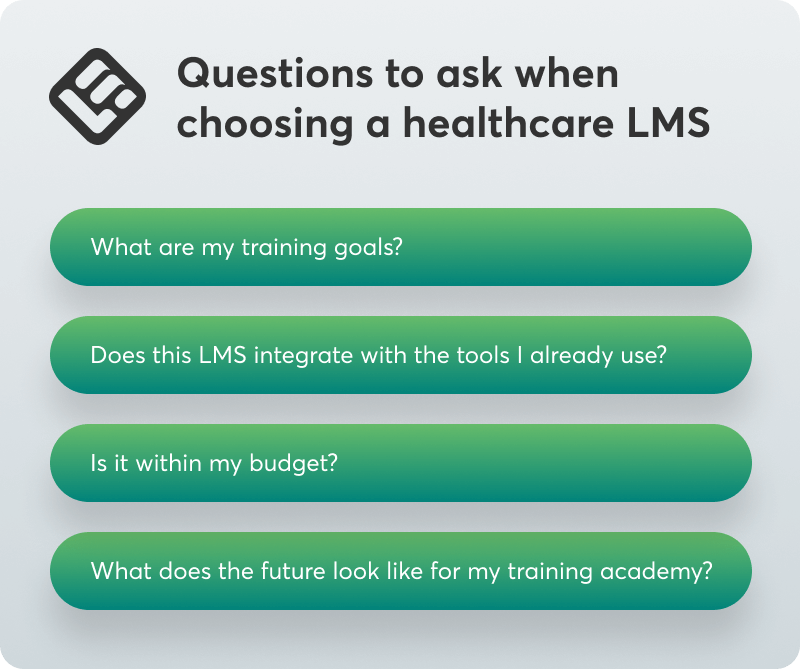
Define your training goals and needs
Start by identifying what you want to achieve with your training program. Are you focusing on compliance training, continuous medical education, onboarding, or patient care skills?
Different LMS platforms offer different capabilities, so having clear goals will help you shortlist platforms that cater specifically to your use case and help you develop the training content you need.
Additionally, consider your learners: Are they clinical staff, administrative personnel, or external contractors? Their learning preferences and accessibility requirements (e.g., mobile access, multilingual support, ADA compliance) should shape your LMS selection criteria.
Choose an LMS that integrates with your existing systems and tools
Interoperability is vital in healthcare environments where systems like electronic health records (EHR), HR software, or scheduling platforms are already in use. Integration with existing tools will reduce friction, streamline data synchronization, and allow you to manage groups of learners more efficiently.
Look for integrations with:
Consider your budget (and look out for hidden costs)
Healthcare LMS platforms offer several pricing models, like subscription, per-user, or usage-based, but it’s essential to balance features with affordability. Define a clear budget upfront and identify which functionalities are must-haves, like compliance tools if that’s where you focus on, versus nice-to-haves, like a mobile app if you don’t need to train deskless employees.
Some often hidden costs include:
A transparent LMS provider will offer tiered pricing and scalable packages that grow with your needs.
Think about scalability and long-term growth
Your organization’s needs today might differ vastly from what they’ll be in two years. Choose an LMS that can scale with your growth, both in terms of user capacity and functionality.
Scalability considerations include:
To help you choose the right learning platform for your healthcare company, we have created an RFP template with prebuilt questions.
Which is the best healthcare LMS for you?
In this article, we reviewed the top-rated health sector LMS providers that cater to a wide range of training needs and are suitable for both small businesses and large enterprises.
LearnWorlds stands out for combining advanced features with ease of use, customization, and scalability options. Create interactive learning experiences, deliver on-the-go training, manage multiple academies and unlimited users, and monitor compliance all from one secure platform.
Try LearnWorlds with a 30-day free trial to see how we can help you transform your healthcare training.

Androniki Koumadoraki
Androniki is a Content Writer at LearnWorlds sharing Instructional Design and marketing tips. With solid experience in B2B writing and technical translation, she is passionate about learning and spreading knowledge. She is also an aspiring yogi, a book nerd, and a talented transponster.
Kyriaki is the SEO Content Manager at LearnWorlds, where she writes and edits content about marketing and e-learning, helping course creators build, market, and sell successful online courses. With a degree in Career Guidance and a solid background in education management and career development, she combines strategic insight with a passion for lifelong learning. Outside of work, she enjoys expressing her creativity through music.
FAQ
Everything you have ever wondered, but were too afraid to ask...

